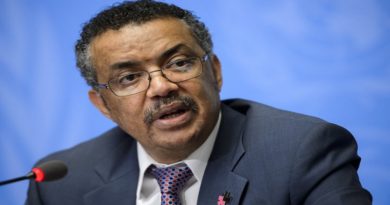Experts explore ways to promote health, climate policies links
Against the backdrop of outbreak of diseases and the need to promote clean environment, key policymakers and leading experts gathered last week, at the World Health Organisations’ headquarters in Geneva to explore opportunities and threats to human health from climate change, Kayode Aboyeji with agency news reports.
Discussions that bothered on ways to promote links between health policy and climate policy; enhance climate resilient health systems and support health-promoting climate change policies formed the kernel at the WHO conference last week.
The conference that drew Ministers of Health, Environment, Energy and Development from United Nations member states, senior civil servants, experts, UN agencies, NGOs, chief executive from health authorities and relevant private sector entities also focused on security of health systems around the world as it increasingly threatened by climate disruption through extreme weather events and infectious disease outbreaks.
Extreme weather events kill tens of thousands of people every year; droughts directly affect nutrition and the incidence of diseases associated with malnutrition; floods and cyclones can trigger outbreaks of infectious diseases and damage hospitals and other health infrastructure.
Taking place ahead of crucial climate negotiations, including the UN Secretary General’s landmark Climate Summit in New York on 23 September, the conference is providing a spring-board for action to address these effects on health, and is providing policymakers from the worlds of health and environment with a much-needed forum to strengthen health systems and therefore improve the lives of millions.
In her speech at the conference, Executive Secretary, United Nations Framework Convention on Climate Change (UNFCCC) Christiana Figueres said when looking at the immense challenge of climate change, it is easy to think that climate change is the equivalent of a disease.
“However, climate change is not a disease. Climate change is actually the symptom. At the heart of an effective response to climate change is the challenge of taking responsibility for our actions and above all, making tough decisions to change the patterns that have been at the base of our development over the past 100 years, if we are to prevent severe worsening of health and quality of life conditions over the next 100 years.
“In the health sector, treatment and prevention, the two integral parts of health management, are usually different, requiring separate funding and differentiated measures and approaches. In addressing climate change, treatment and prevention are fortunately nested in each other. For climate change, the treatment is the best combination of policy and financial instruments that lead to a transformation of energy and land use.
“That means policy in communities, cities, regions and countries and at the international level, and financial instruments that are appropriate and effective for each of the various sectors that need transformation. This is the treatment that starts to shift from wasteful, high-carbon products and lifestyles toward low-carbon, resources efficient ones.
She said from the health perspective, climate change is precisely that accelerating phenomenon that is already affecting, in particular, the most vulnerable populations due to impacts that are no longer preventable. At the same time, climate change is a global reality that threatens to impose much more severe and widespread health impacts, which could be avoided with timely measures.
According to her, the use of fossil fuels to meet growing energy demand is increasing respiratory disease and cancer from carbon pollution. Changes to rainfall patterns is causing a scarcity of clean, safe water to some places and floods to other places, with the respective host of health problems and food insecurity to each. And global temperature increase is expanding the range of vector and water-borne diseases.
She added that as the world becomes hotter and more densely populated, and as the demand for food, water and energy grows, these health impacts will exponentially spread and accelerate, potentially overpowering the response capacity of health and disaster reconstruction sectors.
“If policy is the treatment, then right now governments at all levels are writing prescriptions.
“GLOBE International reports almost 500 climate change laws in more than 60 countries covering more than 80% of emissions. Most of these laws promote clean, efficient energy that provides price stability and eliminates carbon pollution.
“At regional and local levels, we find that more and more cities–a major source of emissions– are adopting climate friendly policies because they benefit revenue and cost, citizen satisfaction and water, food and energy security. These policy prescriptions bode well for public health and welfare.
“At the individual level, people increasingly find that electric cars, bike sharing, public transport and energy efficient homes powered by renewables all make sense.
“Investors analyzing the risk from stranded assets find opportunity in the growing green bond and clean energy markets. And there is increasing understanding that looking past the next quarter is sound strategy in a carbon-constrained world.
“Institutions such as universities, faith groups and even the British Medical Association are looking at their pension funds, procurement and practices. They are discovering that divesting from fossil assets guarantees better retirements and efficient operations save money. Corporations are reporting carbon footprints and seeing significant bottom line improvements by reducing their footprints and greening supply chains. And they realize reputation gains from offsetting the carbon they cannot eliminate.
“All of this is good news, it is good treatment, but it is not enough to prevent the major impacts of climate change. In order to prevent the worst, governments of the world must build the international regulatory structure that provides irrefutable evidence of their commitment to tackle climate change,” she added.
In a video message to the conference, UN Under-Secretary-General and UNEP Executive Director Achim Steiner said: “The initiative taken by the WHO to call this first-of-its-kind conference on climate and health comes at a particularly important time.”
“As the world prepares for its negotiations in Lima and in Paris in 2015 to renew its efforts to address the challenges of global warming and climate change, the nexus between human health and the environment, and also between climate change and human health, are becoming ever more obvious and also an opportunity for action.”
“I hope this conference will give us direction in how we can address what is ultimately an enormous opportunity to achieve successes on multiple fronts,” he added.




